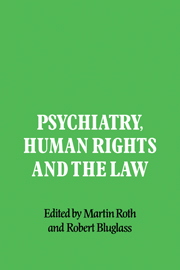Book contents
- Frontmatter
- Contents
- Editors' preface
- Contributors
- The historical background: the past 25 years since the Mental Health Act of 1959
- The social and medical consequences of recent legal reforms of mental health law in the USA: the criminalization of mental disorder
- The recent Mental Health Act in the United Kingdom: issues and perspectives
- Medical and social consequences of the Italian Psychiatric Care Act of 1978
- Lessons for the future drawn from United States legislation and experience
- Recent developments in relation to mental health and the law in the Federal Republic of Germany
- Psychopathy and dangerousness
- Dangerousness in social perspective
- Psychiatric explanations as excuses
- Detention of patients: administrative problems facing Mental Health Review Tribunals
- Developments in forensic psychiatry services in the National Health Service
- The role of psychiatry in prisons and ‘the right to punishment’
- Human rights in mental health
- Changes in mental health legislation as indicators of changing values and policies
- The Danish experience: one model of psychiatric testimony to courts of law
- A postscript on the discussions at the Cambridge Conference on Society, Psychiatry and the Law
Psychiatric explanations as excuses
Published online by Cambridge University Press: 04 August 2010
- Frontmatter
- Contents
- Editors' preface
- Contributors
- The historical background: the past 25 years since the Mental Health Act of 1959
- The social and medical consequences of recent legal reforms of mental health law in the USA: the criminalization of mental disorder
- The recent Mental Health Act in the United Kingdom: issues and perspectives
- Medical and social consequences of the Italian Psychiatric Care Act of 1978
- Lessons for the future drawn from United States legislation and experience
- Recent developments in relation to mental health and the law in the Federal Republic of Germany
- Psychopathy and dangerousness
- Dangerousness in social perspective
- Psychiatric explanations as excuses
- Detention of patients: administrative problems facing Mental Health Review Tribunals
- Developments in forensic psychiatry services in the National Health Service
- The role of psychiatry in prisons and ‘the right to punishment’
- Human rights in mental health
- Changes in mental health legislation as indicators of changing values and policies
- The Danish experience: one model of psychiatric testimony to courts of law
- A postscript on the discussions at the Cambridge Conference on Society, Psychiatry and the Law
Summary
My text comes from a text-book:
The American system of justice is based on the theory that an individual acts with free will. A person who is insane can no longer exercise this free choice.
(Gammage and Hemphill, Basic Criminal Law, 1977 edition, McGraw-Hill, New York, p. 136, my emphasis)My theme is that this is nonsense, both in the United States and in Great Britain. Or, to be more precise, that it over-simplifies the reasons why the insanity defence excuses. To make my point clear, however, I must begin by distinguishing different sorts and purposes of explanation where human behaviour is concerned.
Explanations
Explanations of human behaviour are used in at least five ways:
to predict future behaviour (for example in psychiatric or political prognoses);
to produce future behaviour (for example in elections or psychiatric treatment);
to prevent future behaviour (for example in child-rearing);
to satisfy curiosity about past behaviour (for example in history);
to decide whether past or current behaviour is morally or legally excusable.
This paper is concerned only with explanations of the kind which are relevant to (5); it is not about all kinds of explanation. In particular it is concerned with the sorts which seem to be offered to criminal courts when excusing or mitigating actions. At the sentencing stage psychiatrists in court – and especially in British courts – are often expected also to testify about the treatability of defendants or make prognoses about them; but that sort of testimony is outside the scope of this paper.
- Type
- Chapter
- Information
- Psychiatry, Human Rights and the Law , pp. 96 - 113Publisher: Cambridge University PressPrint publication year: 1985
- 2
- Cited by



